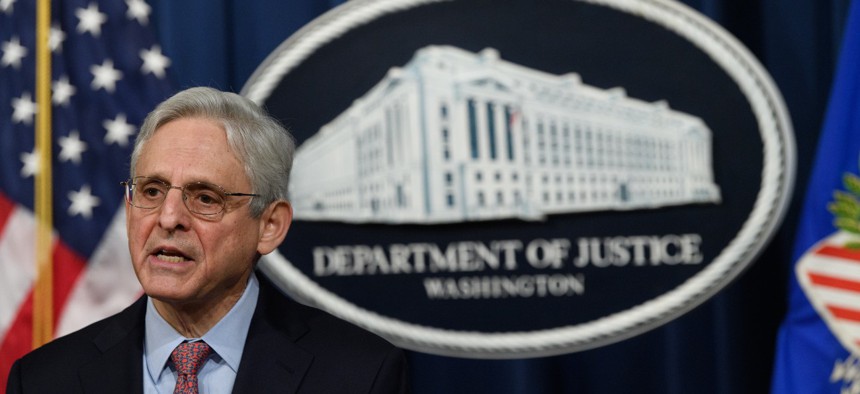
Pool/Getty Images
Coronavirus Roundup: DOJ Amps Up its COVID-19 Fraud Efforts
Here’s a list of this week’s news updates and stories you may have missed.
Speaking at an American Bar Association event on Thursday, Attorney General Merrick Garland expanded on President Biden’s remarks during Tuesday’s State of the Union about how the administration is cracking down on pandemic fraud.
“As the president also noted in his address, I will soon be naming a chief prosecutor to lead specialized teams dedicated to combating pandemic fraud,” which builds “on the existing work of the COVID-19 Fraud Enforcement Task Force that I established last May,” Garland said. “The Justice Department is also working more closely than ever with Inspectors General across the federal government to identify perpetrators of health care fraud, procurement fraud, and every other kind of government-program fraud.”
Garland also noted that the president’s budget request for fiscal 2022 includes an additional $36.5 million for the U.S. Attorneys’ Offices and the Criminal Division, which will help the department increase its actions to combat pandemic fraud. Here are some of the other recent headlines you might have missed.
The Defense Department inspector general will review how military departments are processing exemption requests from the vaccine mandate and handling disciplinary actions, the office announced on Monday.
Next week, the Smithsonian Institution will reopen three museums that were temporarily closed due to staffing shortages as a result of COVID-19 cases. The Anacostia Community Museum will open on March 9, the National Postal Museum on March 11 and the National Air and Space Museum on the National Mall on March 11 (which will only be temporarily open before it closes again for renovations).
Health and Human Services Department Secretary Xavier Becerra was at the COVID-19 briefing on Wednesday, which has not usually been the case. A reporter asked if the public health officials and White House COVID-19 team are shifting from crisis to “more of a long-term management mode” about the pandemic?
“Secretary Becerra has been an essential partner throughout the COVID response, and that work continues going forward,” White House COVID-19 response coordinator Jeff Zients said. “The Secretary is leading many of the critical COVID efforts at HHS…so this is very much business as usual.”
On Thursday, the Senate voted 48-47 on a measure that would end the national emergency for the pandemic that was instituted on March 13, 2020. The White House came out strongly against this. “The national emergency enables the administration to more effectively respond to COVID-19, including ensuring that necessary supplies are promptly available to respond to the virus and facilitating the delivery of health care at a time when our health system has been under tremendous and prolonged stress,” said a statement of administration policy. “These authorities are critical not only to continue responding to the Omicron variant, but also to be prepared to respond to potential future variants.”
Following news this week that the White House is asking Congress for an additional $30 billion for the COVID-19 response, 36 Republican senators sent a letter to the president asking for a full accounting on how the federal government has spent the nearly $6 trillion appropriated over the last almost two years for the pandemic. “While we have supported historic, bipartisan measures in the United States Senate to provide unprecedented investments in vaccines, therapeutics, and testing, it is not yet clear why additional funding is needed,” the senators wrote. “A recent investigative report from Thet Washington Post headlined, ‘Immense fraud creates immense task for Washington as it tries to tighten scrutiny of $6 trillion in emergency coronavirus spending’ details the federal government’s shocking failure to provide the American public with a faithful accounting of how it has spent its money.”
Sens. Chris Murphy, D-Conn., and Ben Ray Luján, D-N.M., both members of the Senate Health, Education, Labor and Pensions Committee, introduced legislation on Wednesday that would bolster HHS’s ability to combat public health misinformation. The bill would allow the HHS secretary to establish a Public Health Information and Communications Advisory Committee within HHS and issue awards for public education initiatives on public health and medicine.
Anna Sorokin (also known as Anna Delvey), the fake German heiress who is now the subject of a new Netflix show, is part of a class action lawsuit filed on March 1 against the Immigration and Customs Enforcement and Homeland Security Department claiming she got the coronavirus because ICE refused to give her a booster shot. “COVID-19 continues to spread rapidly throughout ICE detention centers, threatening the lives of people detained nationwide,” said Eunice Cho, senior staff attorney at the American Civil Liberties Union National Prison Project, who is one of the attorneys for the plaintiffs. “ICE officials have known for months that they must provide booster shots to people in detention, but have failed to do so. ICE’s callous failure to provide this necessary protection is cruel and unconstitutional.”







